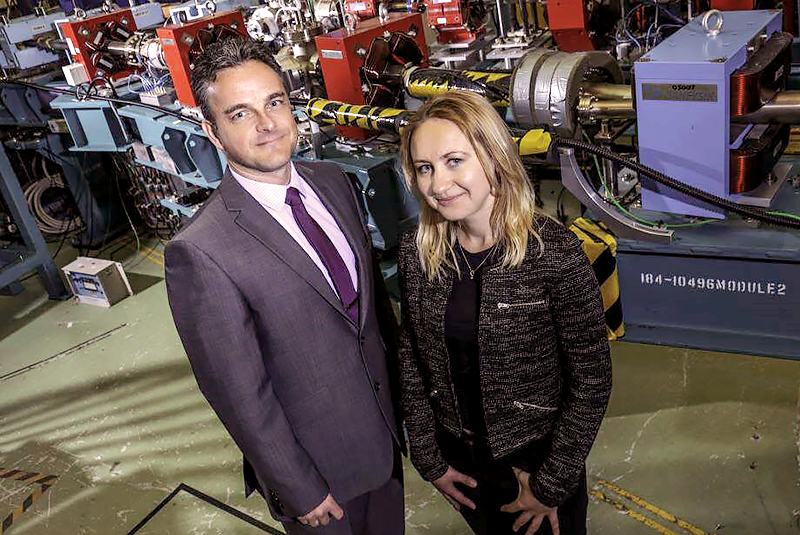
UK start-up accelerates business with CERN technology
by Alexandra Welsch (University of Liverpool)

D-Beam founders Prof Carsten Welsch and Dr Alexandra Alexandrova (Image credit: STFC)
Accelerator R&D is a high-tech area and ideal for the development and exploitation of innovative ideas in technical fields, such as for example detectors, cooling technology and high-performance computing. A network of Business Incubation Centres (BICs) of CERN technologies has been established to assist entrepreneurs and small high-tech businesses in taking innovative technologies from technical concept to market reality.
In total, there are nine CERN BICs across Europe. The Science and Technology Facilities Council (STFC) manages the centre in the UK based at Sci-Tech Daresbury and Harwell. The centre combines the incubation experience of STFC with the unique opportunity to access STFC and CERN intellectual property, technologies and expertise.
D-Beam, a start-up company that originates from the Cockcroft Institute/University of Liverpool and focuses on particle beam diagnostics.
Professor Welsch, Head of Physics at the University of Liverpool, founded D-Beam with his colleague Dr Alexandra Alexandrova. He explains: “D-Beam will be able to translate cutting edge research into commercially available tools that will improve our understanding and control of particle beams. Our goal is to measure any kind of particle beam we're given - electrons, antiprotons, protons, heavy ions: whatever beam, whatever energy, our aim is to measure it better than anybody else.”
The company’s first commercial device will be based on a new type of sensors that can monitor the “halo” of particles lost by a beam. Such losses can range from being annoying “noise” in experiments to causing damages to the accelerator.
The new sensors use optical fibres fitted with advanced photo detectors; each time a stray particle crosses a fibre, it creates a light pulse that can be recorded with extreme precision, giving both a high temporal and spatial resolution. The device has been tested at the Australian synchrotron and achieved the best time resolution for this device. In addition, the company offers unique expertise in beam current, position and profile measurements.
Delyth Lloyd, STFC CERN BIC Manager says: “We are delighted to welcome D-Beam to the STFC CERN BIC. It is especially exciting that D-Beam are a spin-out from the Cockcroft Institute and we look forward to supporting their business growth. I'm sure there will be many collaborative opportunities available for them during their time in the BIC and beyond."
The arrival of new beam diagnostic technologies on the market is expected to improve the precision and ease of use of accelerators and light sources.